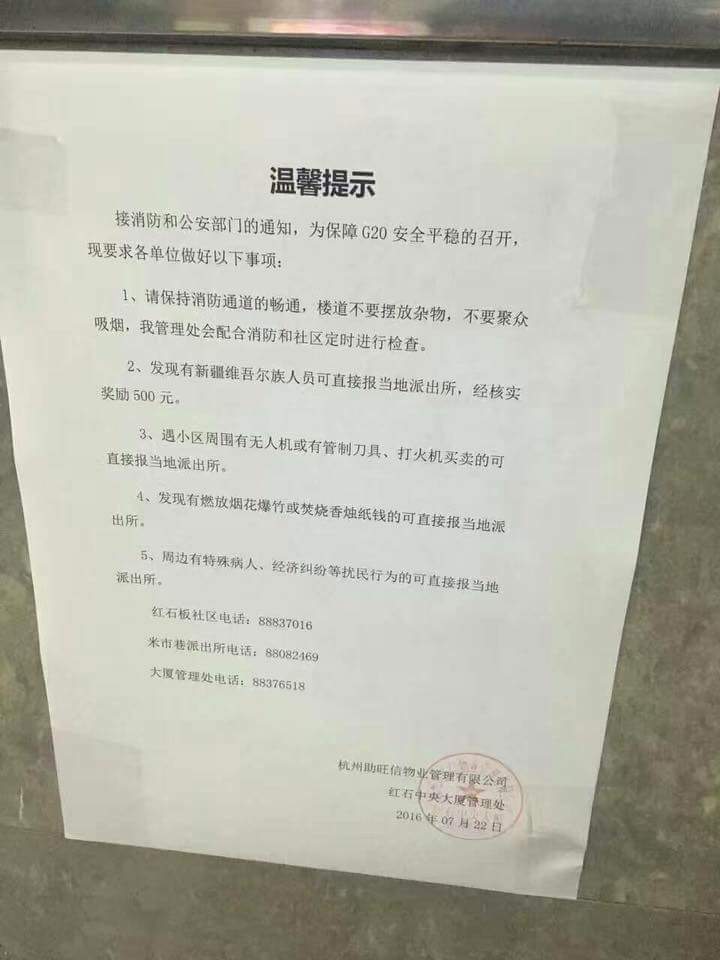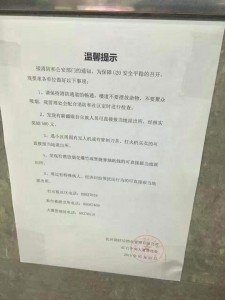Open Discrimination Targets Uyghurs Ahead of G20 Summit in Hangzhou, China

Press Release – For immediate release
5 August 2016
Contact: World Uyghur Congress www.uyghurcongress.org
0049 (0) 89 5432 1999 or [email protected]
The World Uyghur Congress is deeply concerned about open discrimination against the Uyghur population ahead of the G20 Summit in Hangzhou, China after a printed notice surfaced online offering cash rewards for reporting the presence of Uyghurs to police. Any government that sanctions this type of behaviour from its officials should not be fit to chair and host a meeting representing some of the world’s most powerful states whose decisions shape global economic development.
The pictured notice is signed by Hangzhou’s Hongshi property management group and states as one of its stipulations: “If you see Uyghur from Xinjiang you must go to police and may collect 500 yuan reward”.
This notice comes amid increasing crackdowns on the Uyghur population in East Turkestan including ever-tightening restrictions on Uyghur religious and cultural practices, the near-total erosion of free speech and assembly rights, and greater controls on freedom of movement—collectively resulting in a climate of fear and insecurity. These policies have also been coupled with legislation passed in the last two years targeting civil society, basic freedoms and the Uyghur community more generally.
Of great concern for the summit in September has been the potentially crippling effects of China’s recently passed Foreign NGO Management Law, approved in April 2016, which will even further degrade the capacity of civil society to work within China’s borders and require civil society organizations to submit to unrestricted police oversight. Not only does this chill existing work from lawyers, academics and activists, but it further dissuades peaceful and lawful opposition to government policies.
Moreover, this is certainly not the first time that the Uyghur population has encountered overt discrimination outside East Turkestan. Uyghurs and Tibetans have been reportedly placed on a security blacklist at hotels in major Chinese cities, with hotel staff notifying local police if either attempt to check in. Despite this, it was also reported that Uyghurs and Tibetans are able to book rooms, but can expect police or local authorities to pay a visit. Large-scale, international events typically increase these security measures, despite proclamations of inclusiveness from organizers.
The G20 Leaders’ Communiqué drafted following last year’s summit in Antalya, Turkey, made clear mention in its introduction to “recognize that advancing inclusive growth and entrenching confidence require the use of all policy tools and strong engagement with all stakeholders.” This is particularly relevant to the Uyghur population who continue to suffer from severe economic disadvantages in East Turkestan, despite tremendous growth largely benefiting the Chinese population living there instead. As for inclusiveness, China has made great efforts at removing critical voices, rather than embracing them.
The government has already made plans to close churches and ban religious gatherings while world leaders attend the summit. It has also been reported that city officials are trying their best to ensure that residents are not in the city during the meetings, offering a total of $1.5 million worth of travel vouchers to residents there, ostensibly as a means to ensure that the summit “runs smoothly” as one anonymous official put it.
Meetings of this magnitude allow the government to showcase its standing on the world stage, but have also led to protests and demonstrations in the past as states tend to paper over ongoing human rights abuses in the process. The G20 Summit in Hangzhou in September will likely be no different. It is therefore up to states themselves to take a firm stand and call attention to ongoing contempt for international law and respect for human rights while the world is attentively watching.


